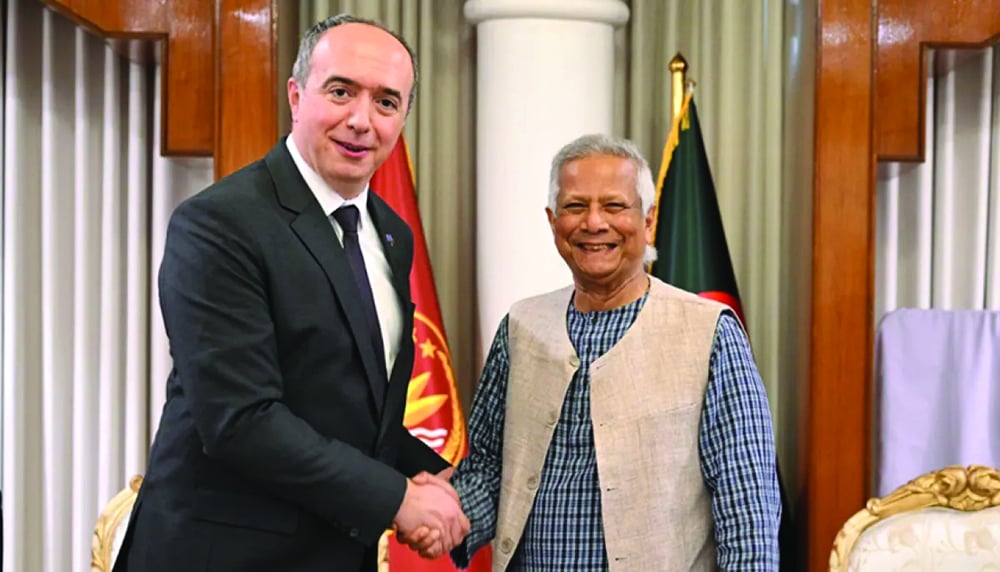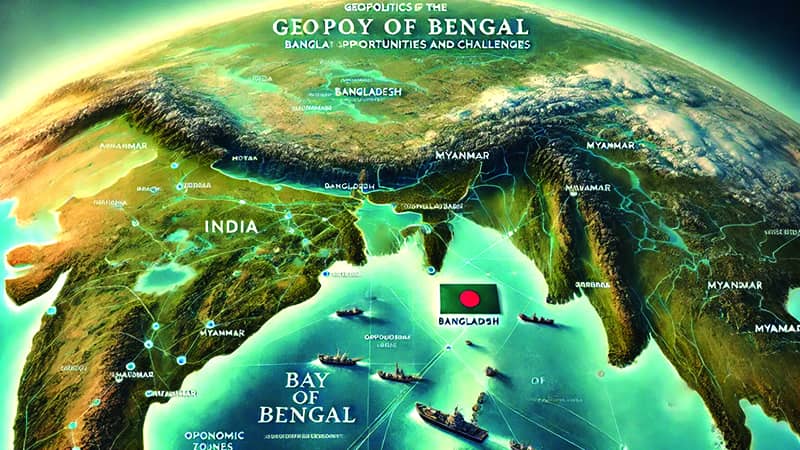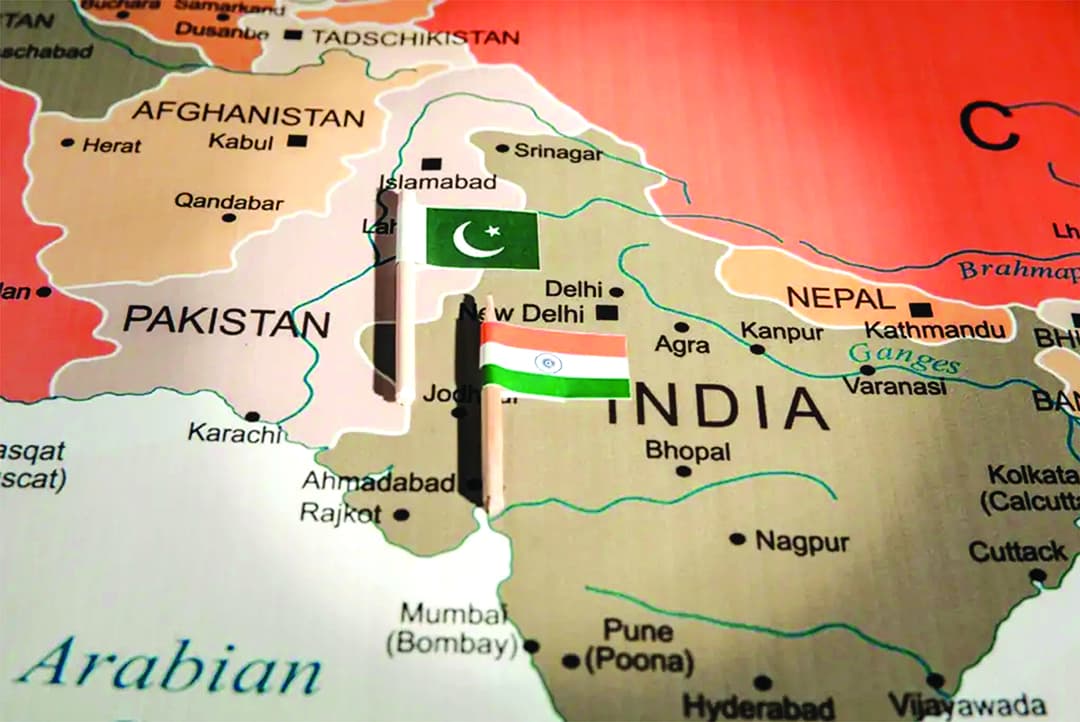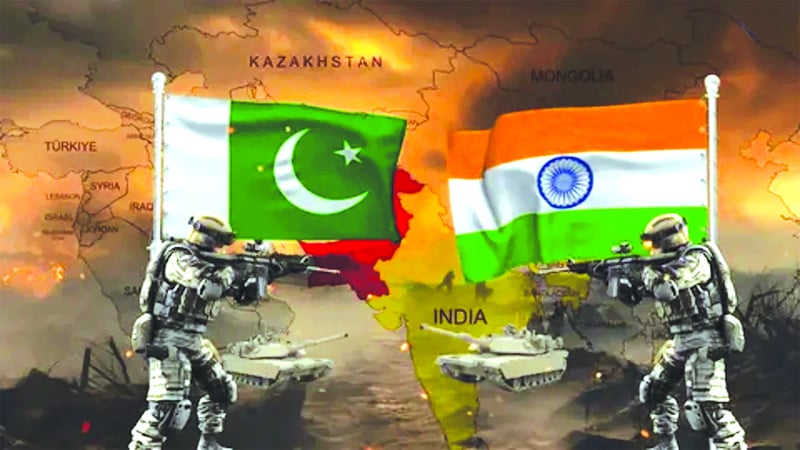THE STRATEGY FOR DEFEAT
THE MIDDLE EAST’S NEVER-ENDING WAR

Air Vice Marshal Mahmud Hussain (Retd)
He was High Commissioner of Bangladesh to Brunei Darussalam. He served as the Chairman, Civil Aviation Authority of Bangladesh (CAAB). Presently, he is working as the Distinguished Expert at the Aviation and Aerospace University (AAUB)
Chaim Weizmann, a brilliant student, on being disappointed for the restricted quotas for the admission of the Jews in the universities, left Russia. Later, having studied Chemistry with a Ph.D. from Switzerland, he came to England and settled down at the University of Manchester. The first years of the 20th century were aflame with the scientific oeuvres in preparation for the coming World War I. The mind of Weizmann found a clue to exploiting his scientific genius for a political cause larger-than-life. He devised a process to extract acetone from maize. The British were in dire need of this vital ingredient for Cordite which is a slow-burning explosive powder, used as a propellent in firearms and artillery. His assistance to the British munitions industry in the war-time did not go unacknowledged. Highly satisfied British wanted to reward him. The fable relating his reply to the British is what makes the character of Weizmann a mythical tale of national patriotism. Weizmann’s dialogue on his accomplishments for the British success can be extrapolated thus:
“Weizmann, we are grateful to you, for your support,” the British said.
“Thank you, Sire,” Weizmann acknowledged.
“We would like to reward you as a mark of our gratitude to your commitment to our cause,” the British said. “What do you wish for? Money, title or any gift,” the British reiterated.
“Nothing, Sire for me,” Weizmann exhorted. “But a piece of land for the Jews in Palestine. We will establish ourselves in Palestine whether you like it or not ……You can hasten our arrival or you can equally retard it. It is however better for you to help us so as to avoid our constructive powers being turned into a destructive power which will overthrow the world.”
Chaim
Weizmann (27 Nov 1874 – 9 Nov 1952)
This single reply fortified by the conviction in the establishment of a Jewish state for his loyalty to the British became the startling truth for the cause of the Jews as a nation-state. Weizmann believed if Jews were helped by exogenous pressure to form a nation, they could lead a normal life only through living together in one home. For them, the home was Palestine. In November 1917, the British government’s Balfour Declaration sanctioned the establishment of a Jewish national home in Palestine. One would find just a few parallels of such incorrigible patriotism in a person in human history where he measures his destiny with the destiny of his co-religionists. The Jews rewarded him appropriately. They made him the first President of the new nation of the Jews.
The United Nations with the British mandate to partition former Palestine into a Jewish state and an Arab state converted Middle East into a region of perpetual war. Palestine is an area of the eastern Mediterranean region that includes the Palestinian territories of the Gaza Strip (along the coast of the Mediterranean Sea) and the West Bank (west of the Jordan River). Surrounding these two strips is the land of modern-day Israel.
FIGURE
2: MODERN-DAY ISRAEL VIS-À-VIS PALESTINE
Since its independence in 1949, Israel and the Arab world have never been in peace. Since that time, Israel has fought a number of conflicts with various Arab forces, most notably in 1948–49 (Israeli War of Independence and Palestinian Naqba), 1956 (Suez Crisis), 1967 (Six Day War), 1973 (Yom Kippur War), 1982 (Lebanon War), 2006 (Second Lebanon War), and 2023–present. But the people who have suffered the most are the Palestinians. Their suffering has been due to the behavioral syndrome of the decolonization process of atavistic instinct. Its roots are planted in the seeds of colonial imperialism and cultural complex.
When the former colonists left their occupied lands and went back home, they also carried back with them a sense of humiliation and cerebral frustration. The only way they could deal with such cognitive incumbrance was by translating inner immobility of their mind into a dynamic perpetuation of conflict orchestrated among the colonized. Shame was not the retribution for blunders on such grand scale. Rudyard Kipling’s opprobrium cast upon the natives ensconced upon the template of White Man’s Burden was the product of a feeling of racist supremacy. It also made them numb to the aspirations, challenges and motivations of the people of the so-called lesser world. Today, one feels that it was the colonial imperialists’ most profound and fundamental failure in preserving moral responsibility as the principled obligation of nation-state system. Today, White Man’s Burden is, no longer, a burden of the White Man but a burden of those who had no part in the imperialists’ creed to a global civilianizing mission. Rather, the part was played by the former colonial masters’ desire to be ever-present in the lands which were not theirs, and to turn once their treasured turfs into politics of chicanery for themselves and desperation for others.
In Hegel’s philosophical dialectic, no history is accorded to the Asians. India and China have great civilizations but no philosophy of history. History belongs to the West whose embodiment is sculpted in the quest for domination and expansion of power. Their mission is one prolific task of unifying the world under the dictatorship of liberal democracy and free-market economy. Hegel wished to see the “End of History” in the creative ingenuity of the Europeans. But Hegel has been proved wrong. Unity is not the panacea for mankind. Unity is multi-dimensional, if not, at least binary in every manifestation of nature.
So, when the British left, this binary disposition characterized the failing of a high moral obligation. The division of Indian sub-continent into Pakistan and India must not be judged as a blunder but as a sheer trickster to ensure perpetuation of running to and fro to the west by both Pakistan and India in times of crisis. Same argument can be leveled at the discretion of Balfour Declaration to make sure that the western domination of the Arabia of Lawrence is perpetuated through the enigma of a geo-political vision. Indo-Pak sub-continent and the Middle East are the glaring examples, in recent times, of the presence of hidden imperialism. In the waning days of British imperialism, the British needed someone to replace them who could rightfully oversee the political goals of the west. The United States was the proper substitute with its material wherewithal. British delivery of their rights of imperial might to America was a geo-political vision that not only ensured American presence everywhere but was exactly what Europe needed and wanted as a re-visit of their past colonial history across the world. The US and Europe blended into one-fold of spiritual finesse. Whether the US had moral advantage over non-western nations depended on the western narratives, which was capable of clothing the facts in their own language. The text of their language is powerful and undeniably more political than rational.
Iranian
retaliatory strikes cause extensive damage in Israel. Photo: Reuters
In 2022, Benjamin Netanyahu returned to power after winning the elections. He leads an extreme far-right government which wants to annex Gaza into Israel. Netanyahu was always vociferous in his claims about Israel’s existence being threatened by Hamas who has controlled Gaza since 2007. Hamas has operated as a proxy of Iran. Iran and Israel had cordial relations during the Cold War. Their relationship snapped after the Iranian Revolution when Iran turned into a theocratic state. Since 1979, Israel has no diplomatic relation with Iran. After 1991 in the aftermath of the Gulf War, the relationship has been hostile.
Hamas had been planning to attack Israel since 2021. Netanyahu’s propensity for xenophobic nationalism matched well with Hamas’s instinct to deny Israeli nationhood in igniting a calamitous political strife. The spark was provided on 7 October 2023 when Hamas launched a surprise attack on Southern Israel off the Gaza strip. More than 1200 Israeli civilians and military personnel were killed and 250 were taken hostage into Gaza. The Hamas hubris could not go unchallenged. Netanyahu who wants a permanent occupation of Gaza was looking for just an opportunity to attack anti-Israeli lobby. And he responded with a fierceness and power that has brought the entrails out of the enemy’s guts with permanent extinction.
Israeli Defense Forces (IDF) has decimated the Hamas; today almost 70 percent of the Gaza is under the control of the Israelis. Hezbollah’s fighting capabilities have been virtually down to zero. Syria has no choice but to surrender to the military might of the IDF. Houthis’ capabilities to launch missile attacks into Israel have been destroyed. All this signifies the military successes of Israel albeit with US support. Israel has been able to neutralize its enemies but with a caveat that caps the loss of human lives with a permanent mark on its moral standing for having prosecuted a planned campaign of genocide, mostly women and children, in Gaza.
As of 25 June 2025, 56,772 Palestinians have been killed. 80% of the Palestinians killed are civilians as reported by Gaza Health Ministry. UN Women estimates that casualty figures for women and girls are 28,000. These figures underscore the shattering human toll of the conflict, and of lives and futures lost too soon. Statista reports the population of Gaza at 2.1 million at the end of 2024 which is a 6% decline from the previous year due to the war. There has been a further decline of its population since March 2025 when Israel broke the ceasefire. Israel has virtually destroyed all its infrastructures, electricity, water supply and even hospitals in Gaza.
It seems that Israel has not been content with the limited war objectives but has raised it to the mission of total war of ethnic cleansing of the Palestinians. Since October 2023, it has continued ground and air attacks in several Palestinian cities and refugee camps in the Israeli-occupied West Bank. The Israeli incursions have led to clashes with Palestinian militants. The United Nations has recorded more than 800 Israeli settler attacks on Palestinians between October 2023 and May 2024. Since 7 October 2024, Israel has continued with the arrests of West Bank Palestinians unabated.
The Israeli–Lebanese conflict, or the South Lebanon conflict, is a long-running conflict involving Israel, Palestinians, Hezbollah, Lebanon-based paramilitary groups, and Syria. In Lebanon also, Israel’s military prowess remains unmatched till it was put on trial by its own strategic blunder. Israel views Iran as an existential threat on account of Tehran’s rhetoric. Such an Israeli excuse does not make sense. Rhetoric is a political howler which is not unusual in hostile environment. The distance between Iran and Israel is 2,300 km. Iran does not possess nuclear weapons, and is still under IAEA’s scrutiny being a signatory to NPT. Despite Iran’s support for proxy forces in the region, and its arming and financing of Palestinian groups such as Hamas, Iran’s biggest problem is its abandonment by the West through imposition of economic and trade sanctions.
On 13 June 2025, Israel launched surprise attacks on key military and nuclear facilities in Iran. The very first Israeli attack was phenomenal in its effects. It put Iranian air defense out of order, and its clandestine operations assassinated Iran’s top nuclear scientists and prominent military leaders. Iran was able to retaliate by launching missiles at cities and military sites inside Israel defying Israel’s confidence in its much-vaunted mobile all-weather air defense system called “Iron Dome”. So, Israel needed US military action. If the war had protracted for a War of Attrition that could spell disaster to Israeli patience. The US, which defended Israel against Iranian missiles and drones, took offensive action on the ninth day of the war by striking three Iranian nuclear sites. Finally, the US came to the rescue of Israel, and unilaterally brokered Iran-Israel ceasefire.
After the ceasefire, the US seems to be confident in brokering a peace deal for the Middle East. On 25 May, Donald Trump said that he would like to stop the deterioration in the region as quickly as possible. He is keen to strike a deal between America and Iran to make Iran great again. He has accomplished Israel’s desire to destroy Iran’s nuclear sites. He is also interested in brokering a new ceasefire deal in Gaza between Israel and Hamas. But all these initiatives seem a far cry unless and until Netanyahu caves in which seems a distant possibility.
Netanyahu’s worst handling of the Palestinians comes from his short-sighted vision of the war’s end-state. He has misconstrued the utility of military force without a clear-cut strategy. He has turned military virtues into moral turpitude. The worst-case scenario is to belie humanism by reducing its potential to peace and conciliation. Since the ceasefire collapsed in March 2025, Israeli army have unleashed indescribable tyranny by blockading the ongoing humanitarian aid. The entire population of Gaza are now trapped, and subjected to unending killings by the Israeli troops on daily basis. Israelis are forcing the Palestinians to face famine. More than 1 million including every woman and girl are facing catastrophic levels of hunger. So inhuman is the attitude of the Israeli leadership that soldiers have confessed to have received orders from their superiors to shoot at the Palestinians lining up for receiving aid. This reminds one of the scenes from movies of World War II where German officers ordered their soldiers to fire at the innocent lined-up Jews. The nation which forsakes its tragic but courageous past has to accost history at its own peril.
There is still time for Israeli leadership to redeem its defeatist strategy. An offensive aimed at ethnic cleansing of the Palestinians may bring immediate jubilation but at the end, its costs are too high both in domestic and international politics. It will surely produce a split between Israel and Europe. The fate of ethnic cleansing of the Bosnians as a moral failure is still fresh in the European mind. Europe’s own experience with the Jews has been unforgiving. Donald Trump might also run out of patience for Israeli overbearing behavior. Iran with Russia and China on her side may again reappear as a worsening catastrophe for Israel. With no way out, Netanyahu’s only familiar and alternative neighbors will be the Arab world. The most useful among them will certainly be the Palestinians. Unless it is understood immediately, Israel’s future is bleak along with that of Palestine.

























